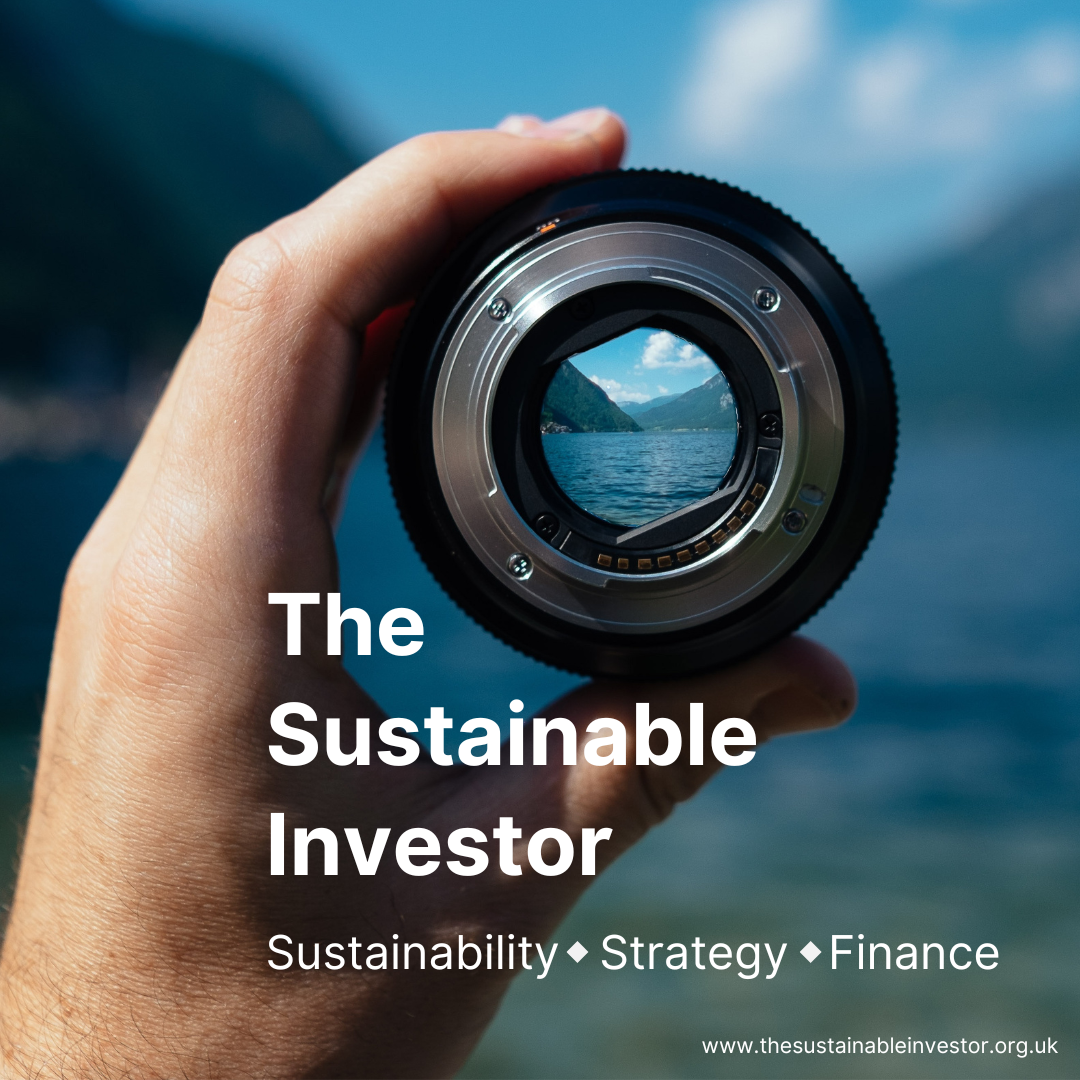
Sunday Brunch: it's companies that will really deliver change (Part 1)
We should not forget that it's companies who will, by and large, deliver the changes. It's companies that will make investments, change products and services, and adopt new operational practices.
"COP28: the UN climate summit ends with divisive deal as countries agreed on a text that encourages countries to move away from fossil fuels and quickly ramp up renewable energy". The Guardian newspaper live coverage December 2023
How we as investors can best encourage companies to change
2024 looks like its going to be another busy year in the world of sustainability, with new reporting regulations, supply chain laws, and yet another COP. While these events are all important, we should not forget that it's companies who will, by and large, deliver the changes. It's companies that will make investments, change products and services, and adopt new operational practices.
And so, in many ways, the ultimate measure of success of any policy, conference or regulation will be 'how has it changed the behavior of companies'? And the same applies to our engagement with companies - do we stand a realistic chance of encouraging change, or are we trying to 'push water uphill with a rake'?
Companies will change either because they have to (safety standards, pollution limitations etc) or because it makes financial sense for them to do so. My observation is that many companies somewhat reluctantly adapt regulations - in some cases doing the bare minimum. By contrast, they often show a lot more enthusiasm for profit enhancing measures.
Most sustainability professionals understand the first category - regulation. We are pretty good at setting rules and targets. The cynic in me observes that we are less proficient at enforcement, especially if it costs money. But that is a debate for another day.
By contrast the notion of 'making financial sense' is less well understood. Which is not good, as the concept of creating long term financial value needs to sit at the heart of how we persuade companies to act.
The true financial value of a company is not created today, or even this year. It's not about the short term. Real financial value comes from actions that produce benefits five, ten or even twenty years into the future. Most truly successful companies prepare for the future, rather than just live in the present.
This is where the sustainability transitions come into play. By preparing for future change, companies can add financial value as well as be good global citizens.
But, we need to differentiate between what adds financial value in the long term, and what is outside the scope of what companies can change. This requires us to understand what levers companies have to pull to create value, and drive change. And hence how we can influence their direction of travel.
If you want to read the rest and are not already a member...

It's companies that will really deliver change
Welcome back. I hope you had a good break and are refreshed to attack 2024. I for one (for personal reasons) was glad to see the back of 2023 (and 2022 as well).
I want to start the 2024 Sunday Brunches by standing back a bit and looking at what we, as investors, can actually deliver. If sustainable investing really does make a difference, then where does it work, and where is it ineffective? And where it works, what we can do to make it even more effective?
Before I start, this blog was previously published as a The Sustainable Investor newsletter on LinkedIn. If you have already read it there, you might want to wait until we publish part 2 - a practical case study focused on supply chains.
This is a longer than normal blog, but I hope you will stick with me, as it sets the background for future discussions. It will also serve as a springboard for future blogs which will look at this issue in some more detail.
One comment I frequently get is that a lot of discussion around sustainable investment is based around rules - such as what is an article 9 fund ? This debate might be useful in terms of identifying those funds that are aligned with your values.

But it's less helpful if you actually want your capital to make a difference on the ground, as well as deliver a fair financial return. And it gives only limited guidance as to how you might engage with companies to get them to change.
The plan is to tackle this head on over the coming months, looking at what has worked in traditional activism, and how we can adapt this to sustainable investing. We broadly agree with Alex Edman's premise, set out in his click bait titled article "The end of ESG". Sustainable investing is not something special - not because it's not important, but because some sustainability factors are value creation factors.
If we are to persuade companies to change we need to focus on this value creation aspect. And equally, recognise when companies are not the people best placed to make change to happen.
First up - why is this discussion important? Put simply, after an extended period when mainstream ESG investing over promised and largely under delivered, we are at the beginning of major rethink. By this I don't mean a rise in ESG bashing. This is often politically motivated and, in my experience, often not based on any sort of detailed analysis.
The sort of rethink I am referring to is one where we separate out what we reasonably can expect companies to change (and where we as investors should focus our efforts), from what needs political and social action.
To misquote Henry Kissinger "if you do not know what you are aiming for, every route will get you nowhere". By treating all issues as ones that companies can fix, many of our resources will be wasted.
Engagement as my preferred investor tool
At the risk of ruining the surprise, it seems to me that the most effective mechanism for investors, if they want to deliver real sustainability change on the ground, is engagement. But this must go beyond voting. We need to work with companies to identify those actions that improve their sustainably and that make long term financial sense. And we need to find ways of persuading them to act.
There is no generic template for this - each companies pathway will depend on the individual characteristics of that company.
This approach has two consequences. The first is accepting that there are some outcomes that companies cannot sensibly deliver on their own. They need the action of governments. For those investors who cannot (or will not) get involved in political and social lobbying, this raises the prospect of not being able to fix some problems. This is understandably a tough one for sustainability professionals to accept. But, there are some issues where we can lobby companies to change, but it's likely that our efforts will have little impact.
The second consequence is cost. Real engagement is time consuming and resource intensive. From my experience, there is no easy or cheap alternative. For those asset owners who want to go down the engagement route - be prepared to spend.
Why I believe this
Let's get a couple of things out of the way upfront. I believe that investors (so asset owners and asset managers) can make a difference to the sustainability transitions via how they use their capital (investments). And I also believe that for many asset owners (from pension funds through to retail investors) caring about the future state of our society, environment, and economy makes good sense. Both financially, and from a values perspective. If you want to learn more about why (the concept of Universal Owners) then I really recommend this paper from Ellen Quigley. To quote Ellen:
"Asset owners such as pension funds, university endowments, and sovereign wealth funds can be considered “universal owners” because they have an interest in the long-term health of the financial system as a whole. As such, they cannot diversify away from systemic risks such as climate change, biodiversity loss, rising inequality, and global pandemics, and can only counter whole-system threats by effecting change in the real economy".
Or to make the point more strongly ....

So, I guess that puts me firmly into the 'sustainable investing can make a positive difference' camp.
But I also believe that there are limitations to what we can expect companies to deliver on their own - and hence what investors can achieve. At least those investors who are seeking a fair financial return. We need to focus our efforts where they have the greatest impact. And we need to avoid the easy but ineffective responses.
A useful framework
A really useful framework for thinking about this is the one used by Kolbel, Heeb, Paetzold & Busch in their 2019 paper Can Sustainable Investing Save the World?

Under this, investors influence companies via engagement, capital allocation and indirectly. In turn, companies undertake actions (make investments) that make the world more sustainable. For today I want to focus on the levers of Capital Allocation and Engagement.
Can Capital Allocation make a difference?
Well sometimes, but not in the way that you might think. And not as much as you might think.
Capital allocation is all about where we put our investments to work. For many this is about screening - not investing in companies that do harm (brown) and/or investing more in companies that do good (green).
Sadly, the evidence for this working seems limited. As Kolbel et al point out in their research report 'to date there is no evidence that screening has led to companies improving the quality of their outcomes'. Or putting it in non academic speak - screening does not seem to lead to more sustainable actions by companies.
To me this makes sense. In my experience companies will largely only act if it makes financial sense for them to do so. If this is correct, then new actions will follow on from:
- new regulation - so actions by governments and the wider society
- being starved of capital for new investments, or
- support from investors for actions that create long term value, but that have negative short term impacts on profitability (jam tomorrow)
Of these the one mechanism that might work as a result of screening is 2. being starved of capital for investments.
The logic here is that by not investing in a company (via buying shares or lending) we limit their access to capital. This means that if they want the capital they need to invest in new projects, they are encouraged to become more green or maybe less brown. If you want to learn more about this I recommend a good research paper from Edmans, Levit & Schneemeier entitled Socially Responsible Divestment.
But this only really works if the company needs access to new external capital. Most equity investors use the public equity markets - which means they trade with other investors. The company doesn't see any of what gets traded. So any impact on their decision making will be indirect.
The exception to this is when the company needs to raise new capital via an equity listing. Green companies do this fairly often, but for most brown companies this is rare - most of them already generate more capital (cash) than they need to fund their investments, with the surplus going back to shareholders via share buybacks and dividends.
So, our ability to influence companies in the public equity markets by screening and exclusions seems limited. The exceptions to this are where companies need to raise new equity, and of course via the debt markets.
The debt markets are perhaps the least understood of the levers that sustainable investors have. The advantage of the debt markets is that many companies raise new debt (including refinancing) on a regular basis, so we have frequent occasions to influence company decision making.
If you want to know more about how the debt markets can impact the sustainability transitions, I recommend this blog from the influential Climate Bonds Initiative entitled explaining green bonds. This is a topic I will be coming back to fairly frequently this year.

Engagement as a better sustainability lever
What do Kolbel et al say about engagement? It's a bit more promising than for capital allocation ...."shareholder engagement emerges as the most reliable mechanism for investors seeking impact".
Perhaps not surprisingly, they found that the impact of the engagement rises with the influence of the shareholder that engages (bigger shareholding = more influence), and with the experience of the company being engaged (more engagement seems to help companies get better at it).
And the impact gets less the higher the cost to the company of implementing the change requested.
This last point is really important. Starting with my comment above .... "companies will largely only act if it makes financial sense for them to do so". If the change you are seeking is cheap to make, the company might do it anyway. But if it involves a material cost, either financial or a disruption, then you need to be able to advance a compelling benefit, before the company will act.
Regular readers of our blogs will know that the various motivations that companies have to act has been an ongoing subject of discussion. Why ? Because unless we understand why companies act, we are unlikely to be able to frame our arguments in a way that resonates with them. Put simply, we need to persuade them using arguments they can relate to. Doing the right thing is by and large not an argument that works.
In a recent Sunday Brunch entitled "can the real sustainable investor please stand up?" we outlined the main motivations of companies to act:
- Threats to their licence to operate
- Anticipated regulatory changes
- Technology
- New customer demands, and the most interesting of all ...
- Using soft assets (intangibles) to create different types of competitive advantage. This includes branding, R&D but also operational processes and staff/community motivation.

So, the good news is that engagement can work. The bad news is that for engagement to be successful, we need to engage on a company by company basis. And most importantly, we need to frame our arguments around the specific issues the company faces. Some of these are external, but many of the barriers to delivery are internal. And the financial benefits of the change are different for each company.
So each engagement has to be specifically designed for that company, requiring us to build up a detailed knowledge of how they operate, the barriers they face to change, and the benefits that they may achieve.
And we need to recognise that this process will take time. Not only for our analysis, but also in building the right relationships. For most companies change is tough, we should not expect it to happen over night.
Yes, this will be expensive, much more expensive than just buying a simple ETF. But, if we want to make our economy more sustainable, then it's hard to see an alternative. We can make our individual portfolios more green via our capital allocation choices ie exclusions etc. But such an approach is unlikely to give us the longer term outcomes we are seeking.
A final thought - what is long term value creation
Before I finish up, I plan to come back to the topic of 'what makes financial sense for companies' in a later blog, as the whole notion of how companies create long term financial value is poorly understood. It's not just about increasing sales, cutting costs or dumping external costs such as pollution onto the wider society.
Companies invest in a while range of activities because it makes long term financial sense to do so. And they do this even when the outcomes are uncertain. Included in this is Research & Development, brand building, and treating their staff and local communities well.
We need to think about preparing for the sustainability transitions in a similar way. Companies know that change is coming, but they don't know exactly when, and how it will manifest. But it still makes financial sense to prepare.
Investors understand that financial value is about future profits. And by future profits, we mean financial returns out to the next decade and beyond.
Something a little more bespoke?
Get in touch if there is a particular topic you would like us to write on. Just for you.
Contact us
Please read: important legal stuff.


